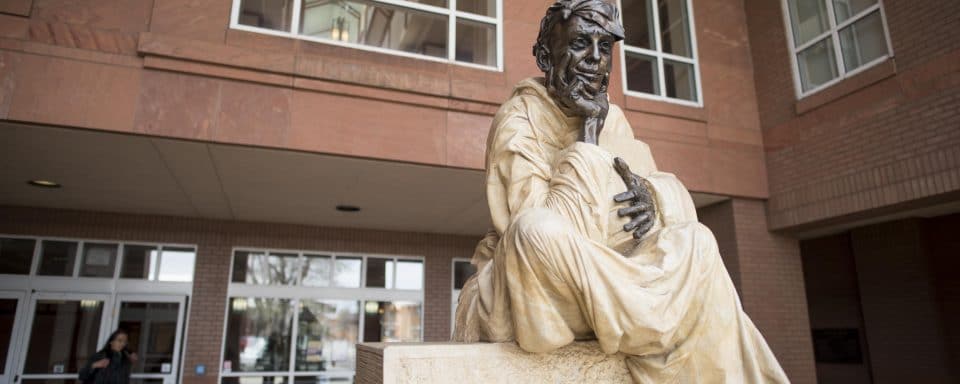About us and the importance of rhetoric

About us
Alana Kuhlman – Director, Lumberjack Writing Center

Amanda MacNair – LWC Program Coordinator
The importance of rhetoric
Rhetoric is the art and study of communicative acts, including writing, speech, images, gestures, symbols, and designs. Rhetoric is used in any act of communication that attempts to influence an audience. Rhetoric is also the study of how those acts work and how they develop, from the moment of generating ideas to their final delivery and reception.
Expanded definition of rhetoric Accordion Closed
Rhetoric is an art and skill that deliberately shapes how ideas are presented in order to influence conduct, mediate power, inspire action, and encourage reflection. Rhetorical study can lead to an investigation of how communicative acts are culturally, politically, and socially bound.
Rhetorical practices encourage mature reasoning, which relies on rhetors being well informed, open to diverse points of view, and aware of the social, political, and cultural aspects of language. The study of rhetorical arguments encourages purposeful analyses and deliberate construction of communicative acts and is essential to civic, professional, and academic interactions. Controlling rhetorical designs acknowledges the power of the dialectic (thesis and antithesis) and the dialogic (relativistic and ideological).
Rhetorical scholars are working to expand our understanding of rhetoric within many different contexts, to include and recover rhetorical practices from a variety of time periods, cultures, and peoples. Understanding and embracing the long and varied history of rhetoric promotes the enhancement of human communication in a global society.
Definitions from the field of rhetoric Accordion Closed
“Rhetoric may be defined as the faculty of observing in any given case the available means of persuasion.” – Aristotle
“Oratory is the power of judging and discoursing on civil matters that are put before it with certain persuasiveness, action of the body, and delivery; it is ‘the art of speaking well’ and the ‘true orator is the good man speaking well.'” – Quintilian
“The duty and office of rhetoric is to apply reason to imagination for the better moving of the will.” – Francis Bacon
“Rhetoric is the art of speaking well, not about this or that, but about all subjects” – Ramus
“Rhetoric is the entire range of resources that human beings share for producing effects on one another.” – Wayne Booth
“Rhetoric is a mode of altering reality, not by the direct application of energy to objects, but by the creation of discourse which changes reality through the mediation of thought and action.” – Lloyd Bitzer
“Rhetoric is articulated through and by bodies […] in cultural contexts” – Debra Hawhee
“Rhetoric is a distributed event that unfolds with time and across networks of complex, dynamic relations. At the heart of this process is rhetorical transformation—a virtual-actual process of becoming in which rhetoric unfolds in unpredictable, divergent, and inconsistent ways. Nonhuman things, such as images, also experience rhetorical becoming (s) in that their potential to alter reality and reassemble collective life is constantly materializing via their multiple and distributed encounters.” – Laurie Gries
“Rhetoric is the ways that individuals and groups use language to constitute their social realities, and as a medium for creating, managing, or resisting ideological meanings” – Martin Nystrand and John Duffy
“Rhetoric is a productive art that is imbricated with the practical arts of politics and ethics […] [Rhetoric] contributes to the perception of material conditions, and indeed at times to their very construction.” – Patricia A. Sullivan and James P. Porter
“Rhetoric is the situated, persuasive use of language that can include both verbal and visual discourse, both public and interpersonal communication, and both explicit and implicit arguments.” – J. Blake Scott
“Rhetoric is culturally informed social actions that participate recursively in the circuit of culture.” – Jacqueline Jones Royster and Gesa Kirsch
“Rhetoric is [an art that] tracks the making of social imaginaries, including their histories, possible futures, and connections to material conditions.” Ralph Cintrón
“Rhetoric is any partisan, meaningful, or consequential text, with the term “text” understood broadly as a legible or readable event or object.” – Carole Blair
“Rhetoric is a ritualized two-sided argument.” – Richard A. Lanham
“Rhetoric is the work that texts do and… the work that writers do in producing them.” – Susan Wells
“Rhetoric is [the symbolic means] of inducing cooperation in beings that by nature respond to symbols.” – Kenneth Burke
“Rhetoric is a form of reasoning about probabilities, based on assumptions people share as members of a community.” – Erika Lindemann
“Rhetoric is the art, practice, and study of human communication.” – Andrea Lunsford
“For rhetoric, the text is the world in which we find ourselves.” – Victor Villanueva
“Rhetoric is concerned with the question of how communication works, how reality becomes presented in language…, and how we come to accept and transform our sense of reality through the means by which it is presented.” – Judith Butler
“Rhetoric is the study of how we use language and how language uses us.” – Krista Ratcliffe
“Rhetoric is… ultimately implicated in all a society attempts. It is at the center of a culture’s activities.” – James Berlin
“Rhetorical education occurs at the intersection of symbol use and symbol reception. It informs both rhetorical production and rhetorical response. Sites of rhetorical education are located in those spaces where people and language and a need to communicate come together.” – Shirley Wilson Logan.
“Rhetoric is “symbolic action through which we humans construct the worlds in which we live.” – Karlyn Kohrs Campbell.
“Rhetoric is the study of the personal, social, and historical elements in human discourse- how to recognize them, interpret them, and act on them, in terms both of situational context and of verbal style. This is the kind of study one has to perform in order to effect persuasion, the traditional end of rhetoric.” – Patricia Bizzell




